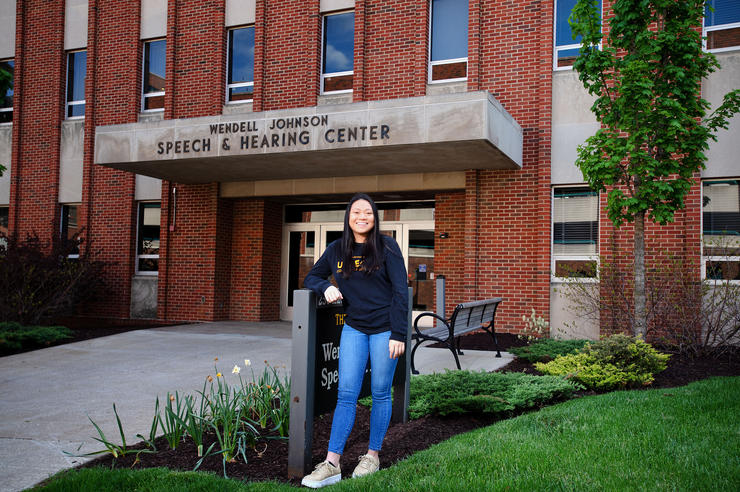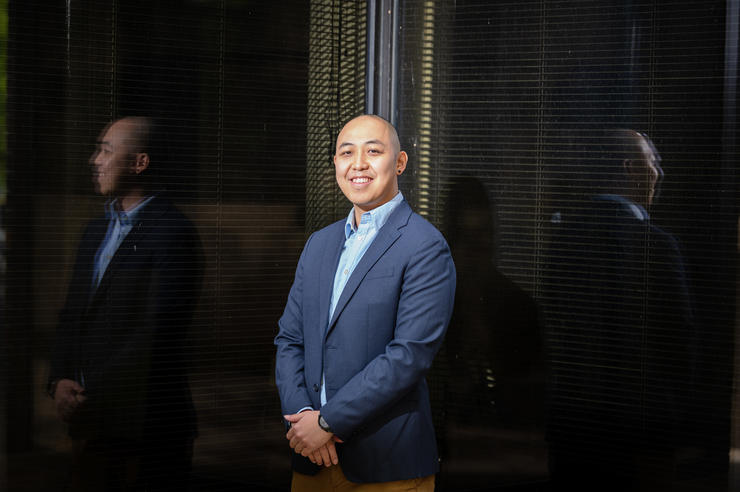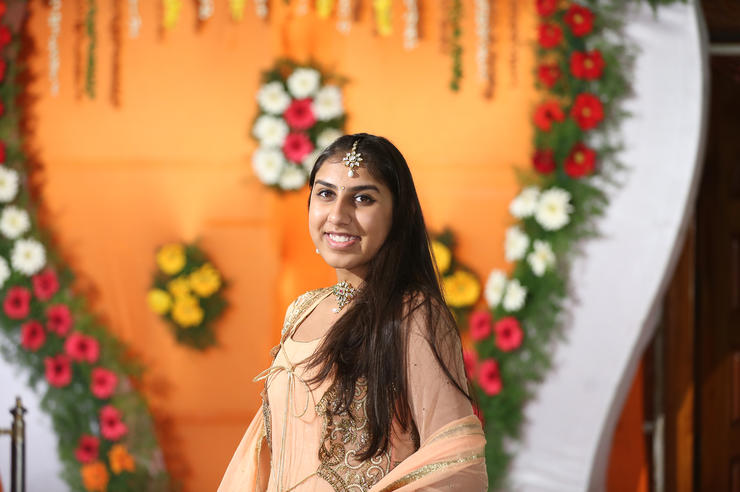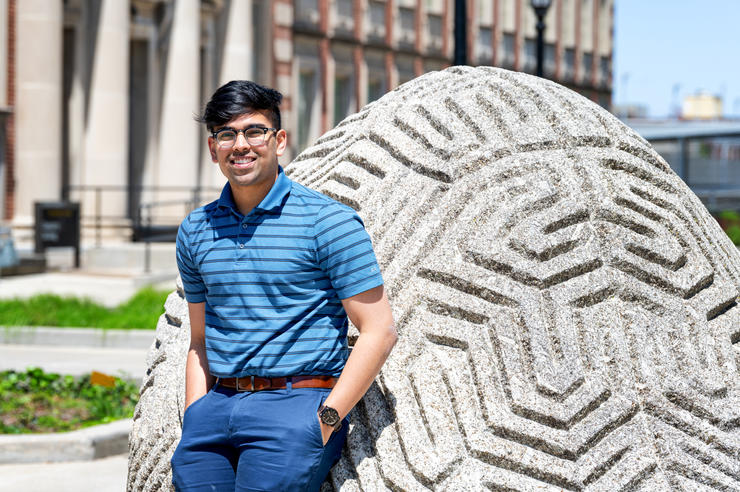Building community on and off campus
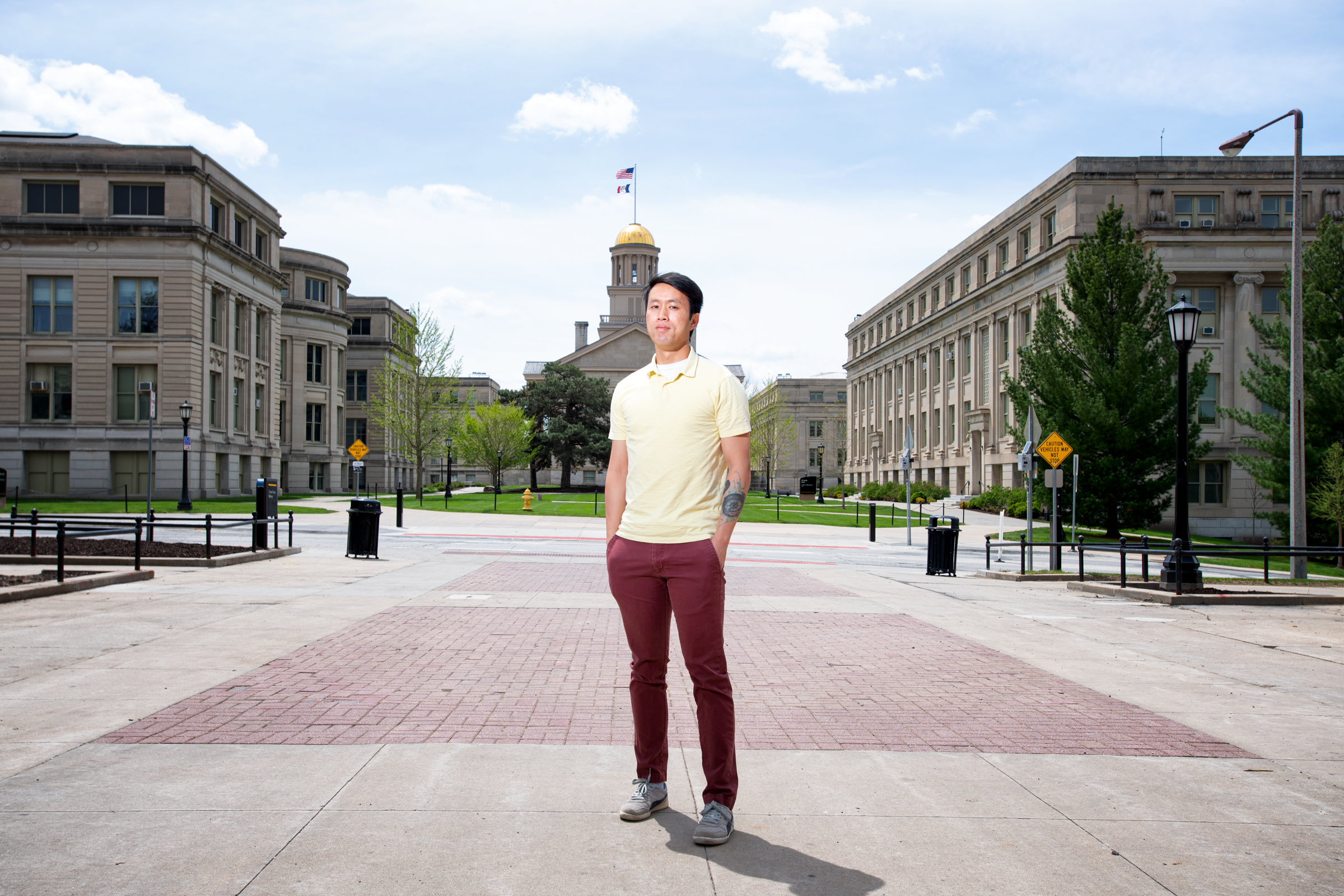
Gordon Louie is committed to building community, and he’s not waiting until he graduates with a PhD from the University of Iowa Higher Education and Student Affairs program to get started.
His work to create a welcoming and inclusive environment, whether on campus as an inaugural member of the UI Pan Asian Council and soon-to-be member of the UI International Student Advisory Board, or in the larger Iowa City community in helping to organize game nights, is rooted in providing a safe space in which to tell your story and listening to others’ stories.
“I enjoy listening to students’ stories and learning from their experiences,” Louie says. “And hopefully I bring something in return from my experiences.”
Louie’s own story started in Guangzhou, China, where he was born. He moved with his family to Las Vegas just as he started elementary school. When it came time to choose a college, Louie decided to stay local in order to continue helping with his much younger sister while his parents worked. His choice of major at the University of Nevada, Las Vegas (UNLV), was influenced by his grandfather and high school teachers and their love of storytelling.
“My grandfather had a lot of impact on my educational life. He was an educator and he liked to tell stories, which was something I really enjoyed during my time with him,” Louie says. “Meanwhile, my history teachers were the ones who had the most influence on me in high school. They were also great storytellers, and their classroom environments were so welcoming. So, when it came time to choose a major, I went with what I knew: history.”
“Being at any of the cultural centers makes me feel more connected to the campus in a way that’s sometimes hard to do as a grad student, when your primary goal is to do research or teach classes. To be able to be in more of these informal spaces with students gives you a better sense of what’s going on, as well as the social climate and environment that you might not get from just being in your academic department.”
Louie’s interest in studying higher education came about in part due to the economic downturn in the late 2000s. Due to lack of funding and assistantships within his master’s program in history at UNLV, he found work in other areas on campus, including admissions, financial aid, operations, and academic advising.
“I learned that higher education was its own field of study,” Louie says. “I never knew that before. Primary and secondary education, sure, but not higher education. So, I started taking some classes here and there.”
He entered a PhD program at UNLV, but decided he wanted to get some work experience at another university first.
Meanwhile, Iowa kept popping up on his radar.
“I went to a conference for the Association for the Study of Higher Education and the first presentation I went to was by (UI Associate Professor) Cassie Barnhardt’s research team. I thought it was an amazing project. That same conference, I attended a grad student coffee hour led by (UI Assistant Professor) Jodi Linley,” Louie says. “Then, at another conference, an Iowa faculty presentation mentioned that Iowa had more than 4,000 international students. That blew my mind. UNLV at the time had 1,100. I needed to know more about what made Iowa so special.”
Louie applied for and accepted a job as assistant director for global community engagement at the UI Tippie College of Business in 2016. He started working on his PhD part time but transitioned to full time in 2018.
As part of two research teams—one led by Barnhardt examining how to internationalize higher education and one led by Sherry Watt analyzing multicultural initiatives—Louie says he is delving into questions that drove him back to school.
“Where does internationalization and diversity converge or diverge?” Louie says. “And how from a practitioner and policy standpoint do we silo those things or bring them together, and in what instances do we do that?”
Watt says Louie is a key partner in her team’s work in exploring how to have transformative learning experiences across difference.
“Gordon is smart—not just smart, but wicked smart in ways that matter. He not only has an exceptional amount of scholarly potential, but also he enters any space with loads of positive energy,” Watt says. “His perspective always adds key ingredients to unveiling innovative practices to address problems in higher education. He is able to soundly explore abstract and complicated concepts and he can do so while also efficiently translating those ideas into implementable plans. This makes him a sturdy scholar who is built for these uncertain times in academia. He is also a compassionate leader who thoughtfully guides groups as they face challenges inherent with injustice and inequity. His scholarly contributions, skills, and talents will make a difference in the future of higher education and in the lives of adult learners.”
Louie’s past work experience also drives another area of research interest.
“I’ve worked before with international students and seen the challenges and unique barriers they face,” Louie says. “I want to know how we can make the environment more welcoming and how we can make the environment more inclusive. Even policy-wise, how can we make policy that is a little more conducive to their experience here?”
Louie says the idea of forming a UI Pan Asian Council had been considered for a while but got off the ground just this year.
“The main goal is to build community,” Louie says. “We also want to be a resource and source of support for not just undergraduate students but also graduate students, faculty, and staff.”
The Higher Education and Student Affairs (HESA) program is committed to producing research and sparking innovative thinking that addresses the contemporary challenges and persistent inequities permeating higher education. HESA offers educational leaders, scholars, and practitioners comprehensive expertise built from a range of intellectual traditions.
Unfortunately, one of the first big tasks that the council faced was the COVID-19 pandemic and the increased threat of discrimination against Asian, Asian American, Pacific Islander, Native Hawaiian, and Pacific Indigenous communities. The council issued a statement April 17 condemning the radicalization of the pandemic, framing the virus as a wartime attack on the U.S., and associating a nationality with the disease.
“It has been heartening to see the support that it’s had,” Louie says. “And the fact that hundreds have pledged signatures of solidarity is encouraging.”
Most of Louie’s experiences with the UI Asian Pacific American Cultural Center have been through attending events, where Louie had valuable interactions with undergraduate students and saw how passionate and engaged they are.
“Being at any of the cultural centers makes me feel more connected to the campus in a way that’s sometimes hard to do as a grad student, when your primary goal is to do research or teach classes,” Louie says. “To be in more of these informal spaces with students gives you a better sense of what’s going on, as well as the social climate and environment that you might not get from just being in your academic department.”
Louie also has found community through another of his passions: gaming.
“There are three things that are always in abundance in Iowa City: book clubs, trivia nights, and game nights,” Louie says. “The book clubs and trivia are fine, but the tabletop gaming community is where I’ve made most of my close friends. It’s a great community builder.”
Louie expects to finish his PhD sometime next year, and he sees a future of possibilities.
“There are things I came into the program hoping I would be able to do when I leave, and those are still there, but what I’ve learned is to be open to opportunity,” Louie says. “I want to do good work. I want to do meaningful work. I want to build better environments for people. But where that happens and how is wide open.”
Louie says Iowa is giving him a solid base upon which he can do his work. And while he knew about the good work being done at Iowa, he says it wasn’t until he visited that he knew for sure it was the place for him.
“I know it’s not just me, but other people, too—the moment they decided to enroll at Iowa was when they visited campus,” Louie says. “Come to campus. You have to see this place.”
